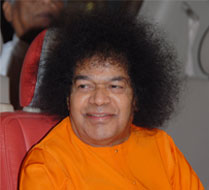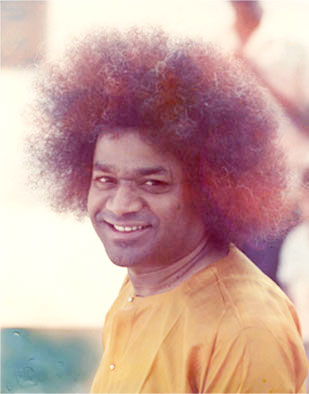 |
 |
 |
 |
 |
 |
 |
 |
 |
 |
 |
 |
 |
|
Baba asked a devotee whom He had chosen for the interview, "Where are you from?" The devotee was startled, since he had been coming to Prasanthi Nilayam for many years and staying there for a few weeks every time. Baba used to accost him not by his name but by the name of the country from which he came, Guatemala. So he gave the usual answer, "Guatemala". Swami's response was Significant. "No! You should say, 'Prasanthi Nilayam!’" He was immensely happy with this remark of Swami which he took as an act of Grace! "Does Swami mean that I will stay in Prasanthi Nilayam for the rest of my life?" he wondered, hopefully! I believe that Baba hopes to get the same answer from all of us. We must learn to have the courage, the confidence and the wisdom to declare with our hands on our heart that we are from Prasanthi Nilayam. That is the permanent residential address of human beings at all times and in all climes, whether they are aware of it or not. Prasanthi Nilayam is not that piece of land near the village of Puttaparthi in Anantapur District, Andhra Pradesh. It is not an entity related to place and time. It is the abode from where all of us have come. It is the name for that state of the source where there is eternal peace because it is Sat Chit Ananda, Truth, Awareness, Bliss. That is our home from which we have migrated through eons, through several incarnations in multifarious frames. We have forgotten that home. We believe that we are what we think we are, and give wrong addresses to each other. We have come to believe that we are the body mind complex with a name and form. Having strayed away from the abode of Supreme Serenity, Prasanthi Nilayam, we have lost inner peace, tossed on the waves of pleasure and pain, loss and gain, honour and dishonour. The Prasanthi Nilayam that Baba mentioned to the devotee from Guatemala is not a stone and mortar structure, as He has so often reminded us. He is not really resident in that building. The Prasanthi Nilayam where He resides is our heart. So, He has advised us to make the heart a Prasanthi Nilayam. The first step is to discover the cause of our plight. We lost our peace when we started chasing the chimera of Desire. "Remember what happened to Sita,” Baba instructs us in an affectionate way. She was very happy in the forest, so long as she had only the one desire to be with Rama, the embodiment and source of Love. But a new material desire for a 'golden deer' overwhelmed her one day. It grew so obsessive that she literally chased away Rama, her Lord. "When Kama (desire) enters your heart, Rama, the Lord departs," says Swami. Both cannot co exist! The "golden-deer" is enticing us in the present age too. We pursue the acquisition of tinsel and trash which, like the golden deer, tantalises us, stopping within reach and slipping when we approach. The hope of success urges us to sacrifice and suffering. Baba names this passion for possession, fire, since it is known in Sanskrit as anala ("never enough") the more you feed it, the bigger the blaze! Baba advises us to reduce desires. Moksha is defined by Baba as moh akshaya; the elimination of possessiveness; of attachment to objects. What a word, "possession!" Who possesses whom, asks Baba: Do we possess the car, or are we possessed by the car? When you become the victim of something without which you feel you cannot get on, then you are enslaved, you are not free. Many things we crave for are mere status symbols. We acquire them to satisfy our vanity, to keep up with the neighbours. The advertisers vie with each other in titillating our vanity: They create a competitive pursuit of pettiness in which our pockets get emptied to fill their coffers. We struggle in this ever expanding syndrome of one-upmanship. The wrist watch is no longer a chronometer; it has become an egometer instead. Dress is no longer the protective garment; it is a medium for parading our bizarre fancies. An automobile is no longer a mode of transport, but a weapon to make the eyes of our neighbours green. All the joy of achievement is only temporary, for it is soon overtaken by dejection. "No. Not enough. I must rise higher, become higher." We run on and on to reach a goal, ever receding beyond the horizon of possibility. Once tied to pleasure and pain, loss and gain, honour and dishonour, we have no respite, no escape. Somebody is always a step higher, a little more swell. Finally we fall behind frustrated, with high BP, or executive stress; nervous breakdown, the physical escape from this doomed game. Baba says that we oscillate perpetually like a pendulum between the two extremes, pleasure and pain, loss and gain, honour and dishonour, etc. Is there no way out? There surely is one, assures Baba. Reduce your desires. Next time, when you feel like buying something, ask yourself, "Do I really need this? When did I wish for this? Am I after this because my neighbour has it? Let him continue to be happy as he is now.” "Stop before you proceed," is the traffic signal useful for us, too, on occasions. When you have suffered from a loss, stop, ask yourself, "is there no other angle from which it can be viewed?" Has it no gain angle? Honour dishonour are a dangerous pair. Here too when we feel insulted or feel that our honour is at stake it is better to look out. The ego plays many a trick. There is no dearth of sycophants around, persons intent on boosting the ego of their victims. They goad others to dabble in dishonourable acts. Beware! The method is simple. Stop the pendulum. Watch out! WATCH, says Baba, your Words, Action, Thoughts, Character and Heart. We have to guard against outside events and influences from moulding our moods and modes. Let us learn to live on our inner resources and educate ourselves to derive joy from Nature itself. A sunset or sunrise, a tree in full bloom, and birds chirping in glee, there are hundreds of pictures around us each of which can give us immense joy, provided we cultivate taste. Learn to give and get joy in a smile; have as a hobby collecting smiles from friends. Change your vision and lo! The whole world appears different. Take everything as it comes; be neither elated nor depressed. Accept everything as a gift of God. Is this a philosophy of resignation? No! Baba is not advocating the resignation that is born of, incompetence, incapacity or cowardice. "Do your best and keep mum!" that is Baba's advice. Doing nothing means that you have failed to use the God given talents for everybody's welfare. Act, Act, with all the strength and skill, all the intelligence and insight endowed by Him. Don't shirk work. He who has confronted you with a problem will also help you to solve it. When some situation challenges you, don't ask, "is this good for me?" Remember that whether it is good or bad depends on how you tackle it. A green mango is sour; but we make pickles of it. A ripe mango is sweet, we eat it with gusto. We enjoy both the sour and the sweet. We do our best, as Baba says, and keep mum! This is the secret of Prasanthi, not to be disturbed by external circumstances. If we can't change the circumstances, let us change our attitude to them. Let us find strength in the inner springs of joy. Prasanthi can be gained only by transcending the pairs of opposites; they disturb us only so long as we are their playthings. All the mantras of the Upanishads end with glum Santhih, chanted thrice. The prayer prescribed by Baba for the Sri Sathya `Sai College has in it the secret for gaining Prasanthi: Asatho maa sadgamaya Lead us from untruth to truth, If we learn to discriminate between asat and sat, between darkness and light, between the transient and the eternal, if we can recognise the immortal amidst the mortal and the dying, we have learnt the secret of peace. What we obtain when we have realised the meaning of this mantram is Santhi. That is the Prasanthi Nilayam which Baba, wants us to reach and realise. He has come to lead us back 'home', yes, every one of us, sooner or later. |
|
 |
With A Vision That Guides and A Mission That Transforms |